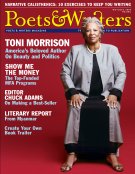As the very act of coming together on equal terms for a salon has reminded us that we are not isolated as writers, the material of our discourse has illuminated the fact that, despite having distinct styles and drives, we share a mutual human project. For discussion during our second meeting, Asuncion chose two essays on spirituality: Federico García Lorca's 1933 lecture "Theory and Play of the Duende" and Fanny Howe's "A Leaf on the Half-Shadow," published in the journal English Language Notes in 2006. These works stimulated a conversation that took off from group members' personal accounts of having sensed attunement to the spiritual while engaged in the process of writing—feeling the pull of flow, not knowing from where words were arriving; being moored in a mind state so lush and tangible, but beyond the realm of the known; approaching meditative clarity while working. My most gratifying writing hasn't been fed by my head, but by a universal, oceanic "something" exterior to ego. Without clear language to discuss phenomena such as this, experiences can feel ephemeral, or even inconsequential. But gathering with a group that understands and empathizes with the challenges posed by the shifting creative mind, and the elations that arise from meeting those challenges, I see that the importance of my work becomes more resonant.
In her essay "Survival in Two Worlds at Once: Federico García Lorca and Duende," Tracy K. Smith writes, "There are two worlds that exist together, and there is one that pushes against the other, that claims the other doesn't, or need not, exist." She refers to the capacity of duende, or the dark spirit (which some in our salon group perceived as death itself, the palpable movement of our own mortality within us), to both pull us toward and repel us from what some might call a higher state, a vaster consciousness, a discovery. In some ways, our lives outside of writing facilitate that centrifugal pushing away, and as I and many of my compatriots have found, a community that validates the opposite—a fearless movement toward the dark other—encourages the writing to approach those uncomfortable places. Talking about the act of writing has helped each of us to realize how much that wilder world does need to exist, and to negotiate its importance in our lives.
According to that Psych 101 standard, Abraham Maslow's hierarchy of needs, when certain basic human requirements are met, our minds are free to explore more philosophical realms. Granted, as graduate students none of us was living a plush life, but we were able to focus less on the minutiae of survival and ego-driven pursuits (notwithstanding the occasional lovesick breakdown or ravenous scavenge for leftovers after a school event) and more on larger pursuits. There was art to be served, and it was our one and only job to serve it. In some respect, many of us joined an MFA program believing that if we wanted our writing to evolve from the fruit of our labor into art, it had to enter the public realm. It had to take a place at the table and enter into discourse with all of the other works that have been and continue to be written. While submitting pieces for publication and seeking opportunities to read remain excellent means of propelling the work into the world, nothing beats offering the tiny body of a poem or story to the live hands of a reader, or feeling that your quietest, most shuttered of lives is in conversation with another. Our postprogram salon has offered us not only a lively arena for sharing our writing with others, but, more important, it's given us a renewed opportunity to share our writing selves with a community of kindred minds each encountering distinct but similar challenges, as emerging artists in the wider world.
Send us a glimpse of your post-MFA story: your toughest—or brightest—transitioning moment, the virtues and vices of your program in retrospect, or a way you found to keep your community solid. Include "Post-MFA Story" in the subject line of an e-mail to editor@pw.org.
Jean Hartig is the editorial assistant of Poets & Writers Magazine. Her chapbook, Ave, Materia, won the Poetry Society of America's New York City Chapbook Contest and is forthcoming in 2009.









